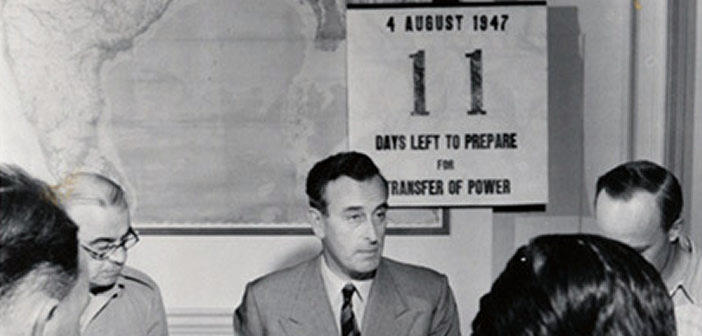On Thursday, the Scottish people will decide their political future, after an agreement between Westminster and Edinburgh for a referendum on succession from the union. This moment in history offers and important for the UK to also consider its obligations towards democracy in its previous colonies.
Why after winning freedom in the wake of Second World War, are the previous British colonies in Asia still yearning for the real freedoms, development, peace and human security? The answer can be found in the design and methods of colonial rule, as well as Britain’s departure strategy from the colonies after 1945.
A number of states of the former British Empire are in the limelight today, with conflicts, violence and wars commonplace. While the Iraq and the Middle East may have dominated the headlines over the previous three decades, the division of the Indian subcontinent has arguably had a greater impact on regional politics.
Sri Lanka, Myanmar, Pakistan and Bangladesh have undergone several waves of conflicts, violence, militarization, civil rights violations and crimes against humanity in the post-colonial era, with only mainland India avoiding broader instability in the region.
Pakistan in particular demonstrates the inappropriate, unrealistic and unjustified designs of colonial Britain, which have resulted into the broader insecurity for the tens of millions Sindhi, Baloch and Pashtun.
Division of India and the creation of Pakistan
The historical record notes that Pakistan was created on the line of so-called two-nation theory based on Indian Hindu and Muslim nationhood, despite the rejection of the idea by the provinces of Sindh, NWFP (now Khyber Pakhtunkhawa – KPK), and Siraiki speaking people of Southern Punjab that together form roughly ninety percent of geography and seventy percent of the population of Pakistan.
The founding political party of Pakistan, the All India Muslim League (AIML), never won elections in British India in Sindh and the KPK and did not win contested elections in Balochistan. It was only East Bengal (now Bangladesh), where the AIML was founded in 1906, that the party won elections in 1946.
If the composition of AIML’s Central Working Committee (CWC) is reviewed, one finds that it only included one Sindhi leader, M. A. Jinnah. The rest of AIML’s leadership was from Northern India, especially from the pre-partition United Provinces (UP) that today form the Utter Pradesh, Bihar and Uttarakhand; Delhi, Punjab (today Indian Punjab), the Central Provinces (CP) comprising today’s Madhya Pardesh and Andhra Pardesh states, and the East Bengal. There was no Baloch or Pashtun member of the committee.
Pakistan was demanded by the population and leadership of the undivided Indian provinces / states that today do not form Pakistan. Since Sindhi, Baloch, Pashtun and Siraiki Muslims formed majorities in their historical motherlands; their interests were secure and almost unchallenged within undivided India. Pakistan was demanded by the Muslim minority population and their aristocrat leadership from UP, CP and today’s Indian Punjab. The creation of Pakistan by forcing together states that were against the very idea of Pakistan was a historical blunder committed by the colonial British rulers against the will of the people.
The Hindu Maha Sabha, Sindh League, Sindh United Party, Unionist Party of Punjab, Sindh Sagar Party, Hur Jam’at (Sindhi), Azad Hind Army, NWFP Congress and Parliament of the autonomous Balochistan were against the partition of India. However, the rest of the Indian political parties remained in favour of Indian partition.
After partition in 1947, the state of Pakistan was taken over by those who migrated from Muslim minority provinces of undivided India and settled into newly formed Pakistan.
Sovereign Sindh and Balochistan
Sindh and Balochistan were once united as the Kingdom of the Sindh, but have thousands of years of history as independent sovereign countries.
The British invaded the Sindh province in 1843 and Balochistan and 1854 in bid to invade Afghanistan, despite treaties in which Britain promised to protect them from invasion if they opened up the Indus River as a route to Kandahar. The British violated these treaties first in the mid-1880s and then again when the states were annexed by Pakistan in 1947 and 1948 respectively.
Sindh waged four wars against the British in 1843, 1843-1857, 1890-1899 and finally in 1940-1943. In the last war against colonial rule, at least twenty thousand Sindhi combatants, known as Hurs, were killed by British military, with thousands of Sindhi families were sent to concentration camps in Sindh, Rajasthan and Bengal as they put down the rebellion of the so-called “banned tribe”. Hurs leader Pir Paga Soriyah Badshah was hanged, along with a number of Sindhi freedom fighters and guerrilla commanders. Some of the fighters remained in Pakistani prisons until 1965, eighteen years after the British departed the Indian subcontinent.
British and internal colonialism in Pakistan
Although British departed from Indian subcontinent in 1947, it maintained its strategic influence within the Pakistani establishment, and the US partnered with Pakistan later on.
Pakistan broke-up in 1971 on the lines of Bengali ethnic-nationhood after the military committed a number of atrocities against the Bengali people including what has been described as “a systematic campaign of genocidal rape” against Bangali women. However, the Pakistani authorities have never been held to account, or appropriately criticised by the international community for their role in the crimes.
The division of Pakistan, itself the product of the “two nation theory” shook the ideological foundations upon which Pakistan was created under the guidance of Britain.
The British connection with the Punjabi dominated Pakistani establishment, partnered by the Urdu speaking northern Indian refugees in Sindh, remain of great importance. This can be demonstrated by the fact that the largest outward migration of people from Pakistan has been ethnic Punjabis, that have preferred to settle in other former British colonies and dominion states, especially the UK, Canada and Australia.
Despite ethnic Sindhis being the largest South Asian contributors of the UK economy, they have never remained on the priority of British engagement with Pakistan.
The current Governor of Punjab in Pakistan, Muhammad Sarwar, was a first generation immigrant Punjabi who did not only become a Parliamentarian in UK but also was the Deputy Leader of the House in Scottish Parliament. He moved back to Pakistan in 2013 and became Governor of Punjab within one month of settling back in the country.
During the 67-year involvement of the UK and US in Pakistan, including during their engagement in Afghanistan in the proxy war against USSR, both have been favouring Punjabis and strengthened Punjabi dominated Pakistan Army on the cost of ethnic-nations Sindhi, Baloch, Pashtun and Siraiki.
Sindh is the largest economic contributor to Pakistan, and Balochistan and Sindh together form the natural resource richest belt in South Asia. However, it is the predominantly Punjabi Pakistani establishment that has benefitted most from these resources, and the Pakistani military has killed thousands of people in both provinces in recent decades.
A Sindh freedom movement has grown dramatically in recent years, and five million Sindhis demonstrated their will for independence by gathering in Karachi on 23 March this year and called for international intervention on their behalf. The Sindhudesh Liberation Army has also raised the prospect of armed struggle, but the group is yet to attack ahuman target.
Meanwhile, since 1999 the Baloch have waged a full scale freedom war in Balochistan against the occupation of Punjab.
Future UK role
The UK has a historic responsibility to address the issues created during the withdrawal of the British Empire from the colonies in the wake of the Second World War. The oppressed nations within Pakistan are a result of the blunders Britain committed in 1947, and it should now revise its policies and engagement with Pakistan to prevent the Sindhi, Baloch, Pashtun and Siraiki people to continue to pay the price of its mistakes.





2 Comments
Shamefully written article. I am a Sindhi from Larkano (Sindh, Pakistan), and I condemn this anti-Pakistan and anti-Sindh article written by Indian agent Zulfiqar Shah.
(Note: The article is totally propaganda tool — India has been involved in sponsoring terrorism in Balochistan and Khyber Pakhtoonkhwa).
@sarfraz abbasi , would you please prove that this article is anti-sindh? you are a film critic and children’s right activist and your slogan is Don’t Follow Me If You’re Easily Offended by Pro-Palestine Tweets, and on your facebook page there is not a single comment in favor of Sindh, why ? is there no any issue ? are you blind? how can you say you are sindhi bla bla bla…..? shame on you man.
keep your collars white then up your finger on others.